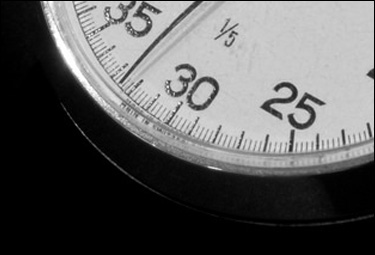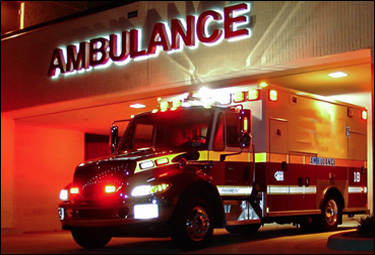|
WHAT
TO DO IF YOU OR A LOVED ONE IS HAVING A
HEART ATTACK? |
 |
It's a nightmare
situation, you or someone you are with
starts having symptoms of a heart attack.
Once a heart attack starts, each minute that
passes reduces a person's chances of
survival. This means that being
prepared by having thought about what you
should do can make a life or death
difference.
FIRST:
You should be aware of the symptoms of a
heart attack. It is very important to
not play "Junior Internet Doctor" and
diagnose yourself with something other than
a heart attack. Many people who delay
treatment do not survive. Testimony
from many of these unfortunate cases state
similar stories, "They thought it was a
pulled muscle or upset stomach", or they
didn't tell anyone around them that they
were in pain and experiencing symptoms of a
heart attack.
In my own
experience I was so sure I couldn't be
having a heart attack at age 46 that I
figured I had Pericarditis, an
infection/inflammation of the sack your
heart sits in. Because I am used to
listening to my body because of all of the
cycling I do daily, I quickly realized that
I was in fact having a life-threatening
heart attack. But I also know the
symptoms because I worked in a cardiac
hospital for years. |
It's important to remember that symptoms of
a heart attack vary from person to person.
Just because you don't have shooting pain
running down your arm doesn't mean that the
heavy, crushing feeling you are experiencing
in your chest isn't a heart attack. My
pain was all the way across my chest - both
sides not just the left. And I had no
pain in my jaw or neck or back or arms.
I did have a tingling/numb sensation in my
fingertips and wrists. But the pain
was limited to my chest and never travelled
anywhere else. I certainly didn't have
the typical heart attack symptoms - but the
pain was beyond anything I'd ever felt.
So I knew it was something very serious.
If I had waited to get treatment I'd
probably not survived another couple of
hours.
Symptoms can be
different between men and women.
Likewise, women generally have higher pain
tolerances than men so their symptoms may be
much less severe.
Here
is a list of the most common symptoms
experienced by heart attack patients:
-
Chest
Discomfort
- Pressure, squeezing, crushing
sensation, dull but intense pain. This
pain can be located towards the left
side of the chest, the center of the
chest, or across the entire chest.
Chest discomfort is the most common
symptom for both men and women.
*This was the
primary symptom that I experienced.
-
Shortness of
Breath
- with or without chest discomfort.
This is much more common in men that in
women.
*I want to
note that I never experienced shortness
of breath.
-
Pain in Other
Areas of The Upper Body
- Pain in your left arm or both arms,
pain in your jaw, back, or stomach.
This is less common in women.
*I want to
note that I never experienced any of
these symptoms.
-
Diaphoresis
(Cold Sweats)
- This is when you feel cold but you are
sweating uncontrollably.
*I DID
experience this symptom.
-
Nausea
- Many heart
attack victims mistake their symptoms
for food poisoning or the flu because
symptoms such as diaphoresis when
accompanied by nausea with stomach pain
and chest pain mask the true underlying
cause.
*I never
experienced nausea or stomach distress.
-
Lightheadedness
- A large
amount of blood is pumped into your head
each heartbeat to keep oxygen flowing to
your brain. If your heart is
compromised and not pumping correctly a
loss of blood volume into your head will
cause you to feel lightheaded, dizzy, or
even cause you to black out.
*I did not
feel lightheaded during my heart attack
but did experience it as a symptom a
couple of hours before my heart attack
started in full.
-
Numbness in
Extremities
- Tingling fingers, numb hands or feet,
numbness in your wrists or arms.
*It was this
symptom that actually convinced me that
I was experiencing a heart attack.
|
|
I THINK I AM HAVING A HEART ATTACK, WHAT
SHOULD I DO? |
 |
If you or anyone
around you are experiencing any of the
symptoms above - do not hesitate to call 911
or seek assistance from your local medical
emergency services.
Do
NOT drive yourself to the hospital.
Most
importantly - REMAIN CALM!
Many heart attack victims suffer from
elevated stress or a panic attack as they
are experiencing their heart attack. It's
hard to not panic because frankly, it's
probably the most painful thing you'll ever
experience. It was for me. Even if you are
not in tremendous pain, it is a very scary
situation and it's VITAL
that you not give into panic or fear. Focus
on something that keeps you calm and keeps
you thinking.
**Panic
causes your body to produce adrenaline -
which makes your heart beat faster.
If you are experiencing a heart attack,
making your heart beat faster may very well
cause your heart to fail completely.
I
cannot stress enough - stay calm and stay
focused on getting through your ordeal and
being alive and healthy when it is over.
Doing this will greatly improve your chances
for survival and recovery. |
| |
|
 |
|
|










